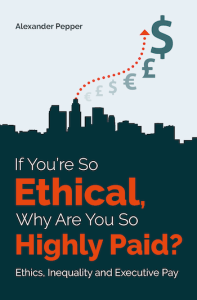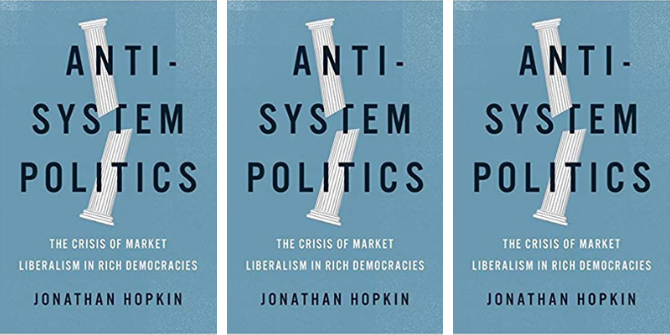In If You’re So Ethical, Why Are You So Highly Paid?, Alexander Pepper argues that soaring senior executive pay in the past 30 years has led to inefficient pay practices and pay inequality in industries including finance, business management, and consultancy. Luke Hildyard finds that Pepper’s analysis of senior executives from around the world offers a persuasive way forward for fairer income distribution in the private sector.
If You’re So Ethical, Why Are You So Highly Paid? Alexander Pepper. LSE Press. 2022. (Open Access).
 Over the past decade, there has been a growing recognition of the socio-economic problems posed by executive pay practices in the UK and across the globe. The extremely high pay levels of what the economist Thomas Piketty called “super managers” – high earning professionals in industries like finance, law, consultancy and particularly business management – create significant inequalities in society. These in turn have been linked to a whole host of worse outcomes in areas like life physical and mental health, drug abuse, social mobility and political polarisation. While income accumulation is not a zero-sum game, it would also be foolhardy to deny that there are occasions when different groups compete for the same pool of income – for example, when employers allocate finite revenues to pay awards – and increasing pay awards for those at the top can also reflect losses for low and middle earners.
Over the past decade, there has been a growing recognition of the socio-economic problems posed by executive pay practices in the UK and across the globe. The extremely high pay levels of what the economist Thomas Piketty called “super managers” – high earning professionals in industries like finance, law, consultancy and particularly business management – create significant inequalities in society. These in turn have been linked to a whole host of worse outcomes in areas like life physical and mental health, drug abuse, social mobility and political polarisation. While income accumulation is not a zero-sum game, it would also be foolhardy to deny that there are occasions when different groups compete for the same pool of income – for example, when employers allocate finite revenues to pay awards – and increasing pay awards for those at the top can also reflect losses for low and middle earners.
The extremely high pay levels of what the economist Thomas Piketty called ‘super managers’ – high earning professionals in industries like finance, law, consultancy and particularly business management – create significant inequalities in society.
In his latest book, Sandy Pepper, one of the UK’s foremost experts on executive pay, examines the issue from an ethical perspective to discuss how we might achieve distributive justice – a settlement on top pay that enjoys public and stakeholder confidence and leads to lower levels of economic inequality.
Sandy Pepper, one of the UK’s foremost experts on executive pay, examines the issue from an ethical perspective to discuss how we might achieve distributive justice
Pepper’s perspective is informed by his career as an executive pay adviser at PwC and greatly enriched by his academic interest in moral philosophy. I read the book on a family holiday. I was greatly educated by the discussion of philosophers like John Rawls and Ronald Dworkin whose theories encapsulate the different approaches to executive pay that I encounter in my working life. By contrast, my father, an academic with limited knowledge of pay governance at large corporations but an interest in philosophy, also picked up the book and was fascinated to see how familiar academic theories were applied to a real-world scenario.
The book begins with a rumination on the different explanations posited for prevailing executive pay levels, before articulating six theoretical frameworks for judging what might constitute a fair or just pay settlement.
The book begins with a rumination on the different explanations posited for prevailing executive pay levels, before articulating six theoretical frameworks for judging what might constitute a fair or just pay settlement. This is an astute and insightful approach that gets to the heart of why executive pay is such a vexatious issue – rather than being merely a technical business governance issue, top pay outcomes are a reflection – perhaps one of the best proxy measurements – of the values that govern our society.
Pepper outlines how people might believe, for example, that a truly “just” distribution of resources should reflect how hard people work (desert); or that it should ensure everyone has sufficient level of income to lead a dignified life (sufficiency); or that it should merely be one that results from respect for property rights, whereby any transfer of resources from one party to another is undertaken under the free will of both parties without interference or coercion from another (entitlement theory). From each framework follows a very different view of what might constitute appropriate levels of pay, and what degree of regulatory oversight might apply to the pay setting process.
Pepper […] identifies four different [theories executives apply to distributive justice] – relational egalitarians, welfare liberals, meritocrats, and free marketeers.
The main element of the book asks what theories executives themselves apply to distributive justice. Bearing in mind that even the harshest critic of business executives and their pay levels would accept we will continue to need people willing to run businesses, and that this will require a level of reward that they perceive to be fair and proportionate, this is a vitally important question. And that critic might find themselves surprised and interested by the answers. From the responses to the series of questions that Pepper puts to his sample of executives, drawn from across multiple countries and industries, he identifies four different types – relational egalitarians, welfare liberals, meritocrats, and free marketeers.
Though these are grouped more sophisticatedly in the book, it is difficult not to read them on a left-right political spectrum. The relational egalitarians believe that fairness – for example, providing everyone with enough to ensure equality of opportunity and a living wage – overrides merit or desert as a priority for determining the distribution of resources. Welfare liberals believe in the benefits of free markets and the importance of merit in determining rewards but prioritise ensuring improved outcomes for the worst-off in society. Meritocrats believe that performance and ability should be the most important determinants of the distribution, but that equality of opportunity should be assured and a safety net in place for the worst off in society. Free marketeers believe in the efficiency of markets and that it is right to reward differential performance differently – although they would not accept extraordinary accumulation of wealth as a result of a dysfunctional or inefficient market.
All [four types of executives] reflect a nuanced and thoughtful approach to how resources should be distributed throughout society.
There were a smaller though still significant number of relational egalitarians but the three other groups were all of equal size. There were no particular concentrations of any of the groups in specific industries or markets. While the free marketeers are probably the closest to the stereotypical CEO imagined by critics of big business, none of the groups really fit this caricature and all reflect a nuanced and thoughtful approach to how resources should be distributed throughout society.
Alongside policy change and investment industry practices, solving this will require executives themselves to accept that there are ethical restrictions on their right to receive and retain excessive income.
Paradoxically, the benign view of executives that emerges from the book provides a lot of succour for critics of executive pay. If executives have a reasonable, balanced approach to pay, they ought to be relatively open-minded about efforts to achieve a more even income distribution – particularly given that little over a quarter of the sample were grouped as “free marketeers” whose favoured philosophy would likely result in the most unequal pay outcomes. Pepper concludes with a discussion of policy measures commonly used to target excessive top pay, including higher tax rates and subjecting pay packages to shareholder approval, before moving on to the concepts of responsible investment and the ethical standards of the executives themselves. Increased investor engagement and the containing effect it has had on CEO pay levels offer encouragement regarding the potential of shareholder stewardship, albeit without achieving a meaningful reduction to the very high levels of inequality in the US and UK. Alongside policy change and investment industry practices, solving this will require executives themselves to accept that there are ethical restrictions on their right to receive and retain excessive income. This proposition which many would have considered highly utopian had it been put to them in the introduction, seems logical, measured and persuasive by the end of this fascinating and insightful book.
Note: This review gives the views of the author, and not the position of the LSE Review of Books blog, or of the London School of Economics and Political Science.
Main Image:







